Analysis of Youth Unemployment and Economic Growth in Tunisia
VerifiedAdded on 2023/05/30
|5
|1281
|415
Report
AI Summary
This report investigates the critical issue of youth unemployment and its profound impact on economic growth in Tunisia. The analysis reveals that Tunisia faces a significant challenge with high youth unemployment rates, attributed to factors such as mismatches between the education system and job market demands, lack of practical experience among youths, legislative barriers, and high corporate taxes. The report highlights the consequences of this unemployment, including youth migration, social unrest, and potential involvement in illicit activities. It proposes recommendations, including upgrading the education curriculum, fostering collaboration between businesses and universities, legislative reforms to reduce barriers, and encouraging entrepreneurship among the youth to address the issue and foster sustainable economic development. The report emphasizes the urgent need for the government to collaborate with the business community to implement these strategies to create a more robust and inclusive economy.
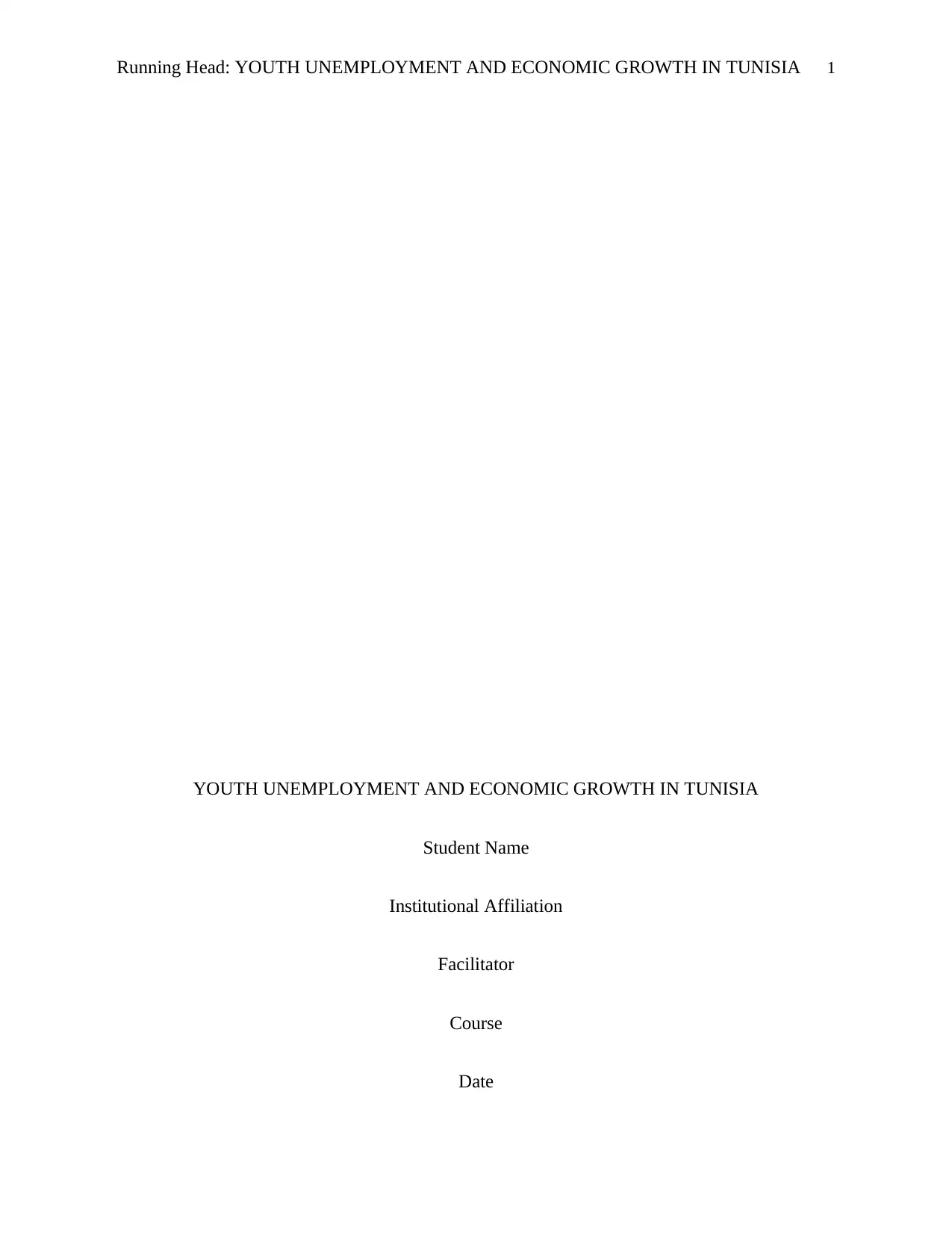
Running Head: YOUTH UNEMPLOYMENT AND ECONOMIC GROWTH IN TUNISIA 1
YOUTH UNEMPLOYMENT AND ECONOMIC GROWTH IN TUNISIA
Student Name
Institutional Affiliation
Facilitator
Course
Date
YOUTH UNEMPLOYMENT AND ECONOMIC GROWTH IN TUNISIA
Student Name
Institutional Affiliation
Facilitator
Course
Date
Paraphrase This Document
Need a fresh take? Get an instant paraphrase of this document with our AI Paraphraser
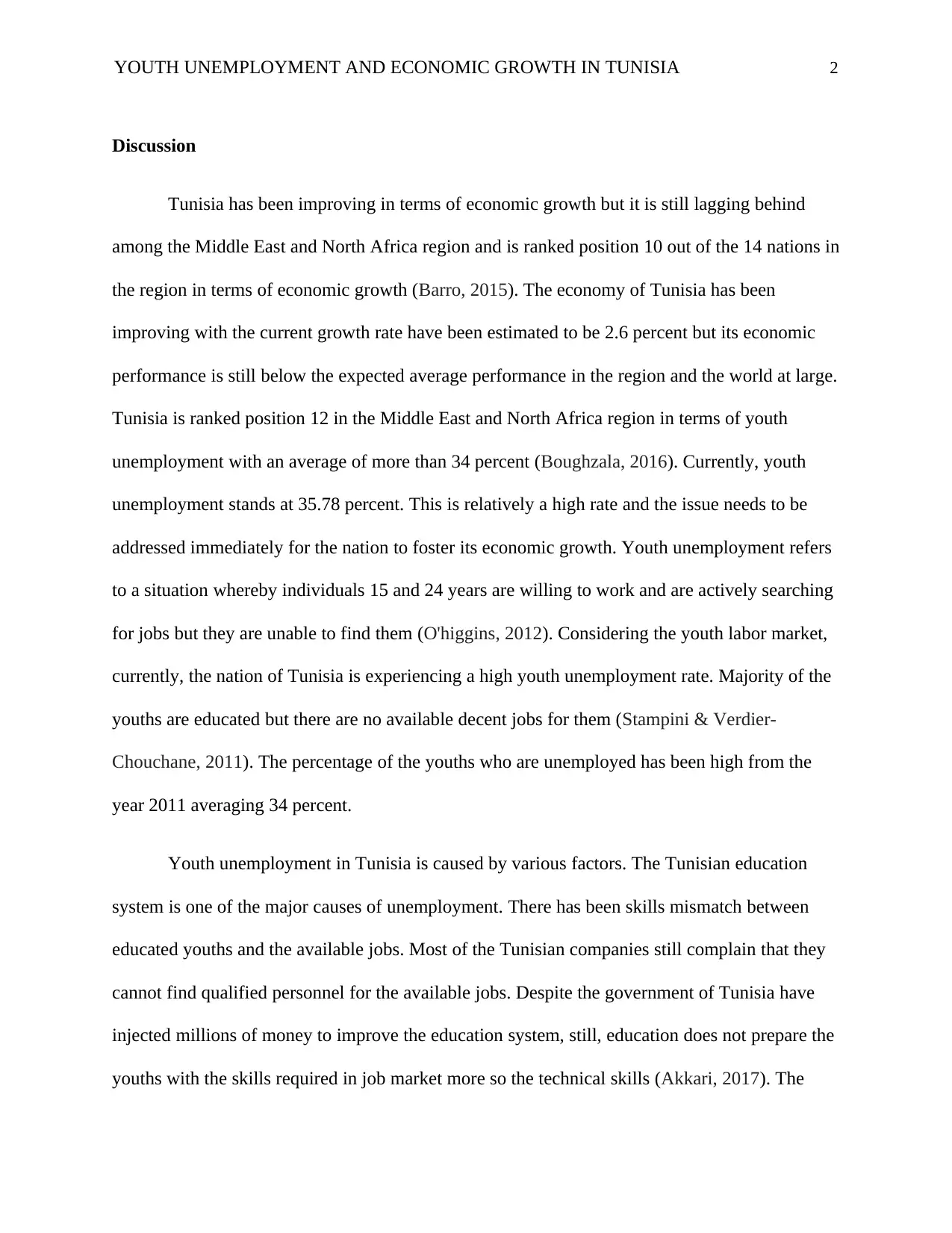
YOUTH UNEMPLOYMENT AND ECONOMIC GROWTH IN TUNISIA 2
Discussion
Tunisia has been improving in terms of economic growth but it is still lagging behind
among the Middle East and North Africa region and is ranked position 10 out of the 14 nations in
the region in terms of economic growth (Barro, 2015). The economy of Tunisia has been
improving with the current growth rate have been estimated to be 2.6 percent but its economic
performance is still below the expected average performance in the region and the world at large.
Tunisia is ranked position 12 in the Middle East and North Africa region in terms of youth
unemployment with an average of more than 34 percent (Boughzala, 2016). Currently, youth
unemployment stands at 35.78 percent. This is relatively a high rate and the issue needs to be
addressed immediately for the nation to foster its economic growth. Youth unemployment refers
to a situation whereby individuals 15 and 24 years are willing to work and are actively searching
for jobs but they are unable to find them (O'higgins, 2012). Considering the youth labor market,
currently, the nation of Tunisia is experiencing a high youth unemployment rate. Majority of the
youths are educated but there are no available decent jobs for them (Stampini & Verdier-
Chouchane, 2011). The percentage of the youths who are unemployed has been high from the
year 2011 averaging 34 percent.
Youth unemployment in Tunisia is caused by various factors. The Tunisian education
system is one of the major causes of unemployment. There has been skills mismatch between
educated youths and the available jobs. Most of the Tunisian companies still complain that they
cannot find qualified personnel for the available jobs. Despite the government of Tunisia have
injected millions of money to improve the education system, still, education does not prepare the
youths with the skills required in job market more so the technical skills (Akkari, 2017). The
Discussion
Tunisia has been improving in terms of economic growth but it is still lagging behind
among the Middle East and North Africa region and is ranked position 10 out of the 14 nations in
the region in terms of economic growth (Barro, 2015). The economy of Tunisia has been
improving with the current growth rate have been estimated to be 2.6 percent but its economic
performance is still below the expected average performance in the region and the world at large.
Tunisia is ranked position 12 in the Middle East and North Africa region in terms of youth
unemployment with an average of more than 34 percent (Boughzala, 2016). Currently, youth
unemployment stands at 35.78 percent. This is relatively a high rate and the issue needs to be
addressed immediately for the nation to foster its economic growth. Youth unemployment refers
to a situation whereby individuals 15 and 24 years are willing to work and are actively searching
for jobs but they are unable to find them (O'higgins, 2012). Considering the youth labor market,
currently, the nation of Tunisia is experiencing a high youth unemployment rate. Majority of the
youths are educated but there are no available decent jobs for them (Stampini & Verdier-
Chouchane, 2011). The percentage of the youths who are unemployed has been high from the
year 2011 averaging 34 percent.
Youth unemployment in Tunisia is caused by various factors. The Tunisian education
system is one of the major causes of unemployment. There has been skills mismatch between
educated youths and the available jobs. Most of the Tunisian companies still complain that they
cannot find qualified personnel for the available jobs. Despite the government of Tunisia have
injected millions of money to improve the education system, still, education does not prepare the
youths with the skills required in job market more so the technical skills (Akkari, 2017). The
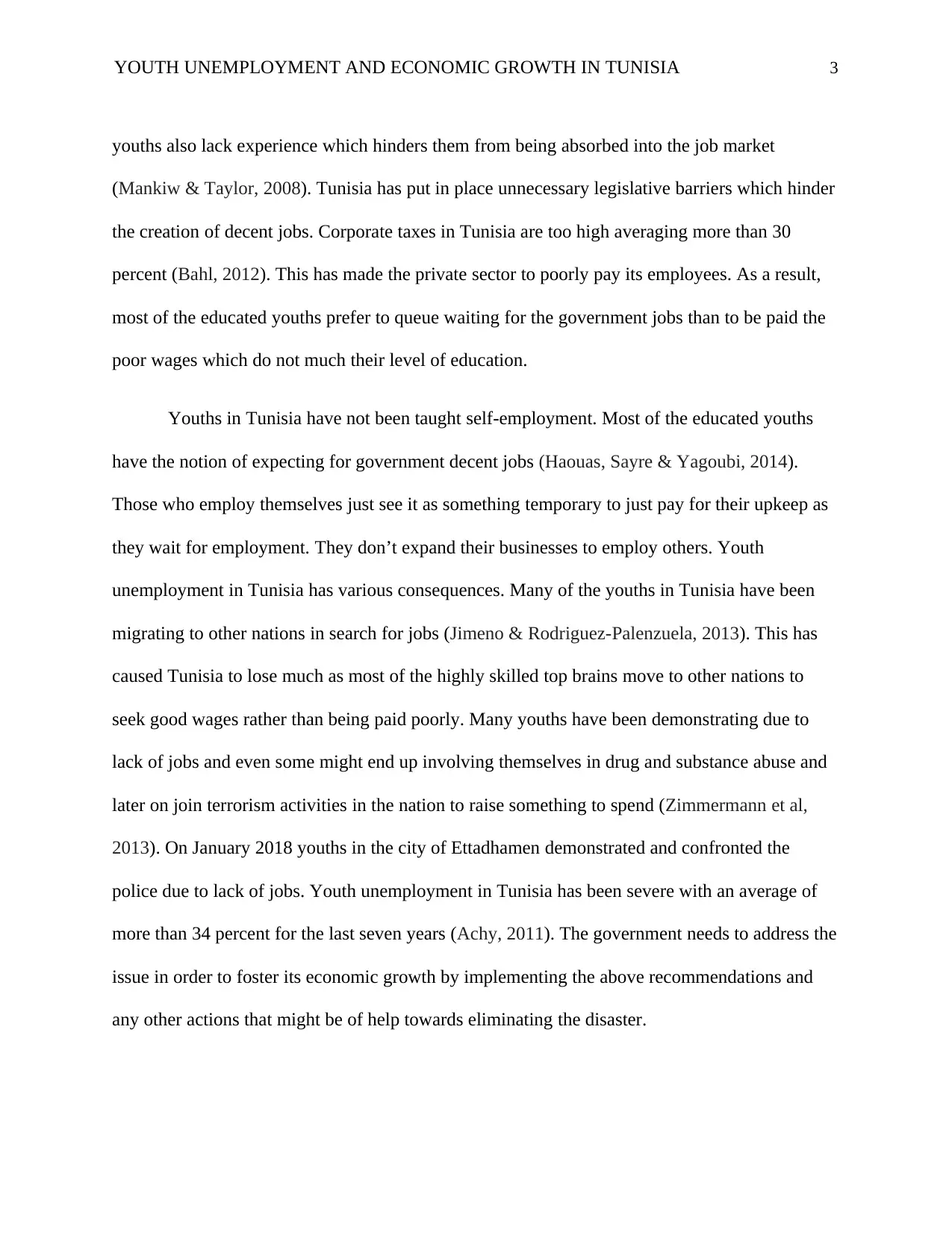
YOUTH UNEMPLOYMENT AND ECONOMIC GROWTH IN TUNISIA 3
youths also lack experience which hinders them from being absorbed into the job market
(Mankiw & Taylor, 2008). Tunisia has put in place unnecessary legislative barriers which hinder
the creation of decent jobs. Corporate taxes in Tunisia are too high averaging more than 30
percent (Bahl, 2012). This has made the private sector to poorly pay its employees. As a result,
most of the educated youths prefer to queue waiting for the government jobs than to be paid the
poor wages which do not much their level of education.
Youths in Tunisia have not been taught self-employment. Most of the educated youths
have the notion of expecting for government decent jobs (Haouas, Sayre & Yagoubi, 2014).
Those who employ themselves just see it as something temporary to just pay for their upkeep as
they wait for employment. They don’t expand their businesses to employ others. Youth
unemployment in Tunisia has various consequences. Many of the youths in Tunisia have been
migrating to other nations in search for jobs (Jimeno & Rodriguez-Palenzuela, 2013). This has
caused Tunisia to lose much as most of the highly skilled top brains move to other nations to
seek good wages rather than being paid poorly. Many youths have been demonstrating due to
lack of jobs and even some might end up involving themselves in drug and substance abuse and
later on join terrorism activities in the nation to raise something to spend (Zimmermann et al,
2013). On January 2018 youths in the city of Ettadhamen demonstrated and confronted the
police due to lack of jobs. Youth unemployment in Tunisia has been severe with an average of
more than 34 percent for the last seven years (Achy, 2011). The government needs to address the
issue in order to foster its economic growth by implementing the above recommendations and
any other actions that might be of help towards eliminating the disaster.
youths also lack experience which hinders them from being absorbed into the job market
(Mankiw & Taylor, 2008). Tunisia has put in place unnecessary legislative barriers which hinder
the creation of decent jobs. Corporate taxes in Tunisia are too high averaging more than 30
percent (Bahl, 2012). This has made the private sector to poorly pay its employees. As a result,
most of the educated youths prefer to queue waiting for the government jobs than to be paid the
poor wages which do not much their level of education.
Youths in Tunisia have not been taught self-employment. Most of the educated youths
have the notion of expecting for government decent jobs (Haouas, Sayre & Yagoubi, 2014).
Those who employ themselves just see it as something temporary to just pay for their upkeep as
they wait for employment. They don’t expand their businesses to employ others. Youth
unemployment in Tunisia has various consequences. Many of the youths in Tunisia have been
migrating to other nations in search for jobs (Jimeno & Rodriguez-Palenzuela, 2013). This has
caused Tunisia to lose much as most of the highly skilled top brains move to other nations to
seek good wages rather than being paid poorly. Many youths have been demonstrating due to
lack of jobs and even some might end up involving themselves in drug and substance abuse and
later on join terrorism activities in the nation to raise something to spend (Zimmermann et al,
2013). On January 2018 youths in the city of Ettadhamen demonstrated and confronted the
police due to lack of jobs. Youth unemployment in Tunisia has been severe with an average of
more than 34 percent for the last seven years (Achy, 2011). The government needs to address the
issue in order to foster its economic growth by implementing the above recommendations and
any other actions that might be of help towards eliminating the disaster.
⊘ This is a preview!⊘
Do you want full access?
Subscribe today to unlock all pages.

Trusted by 1+ million students worldwide
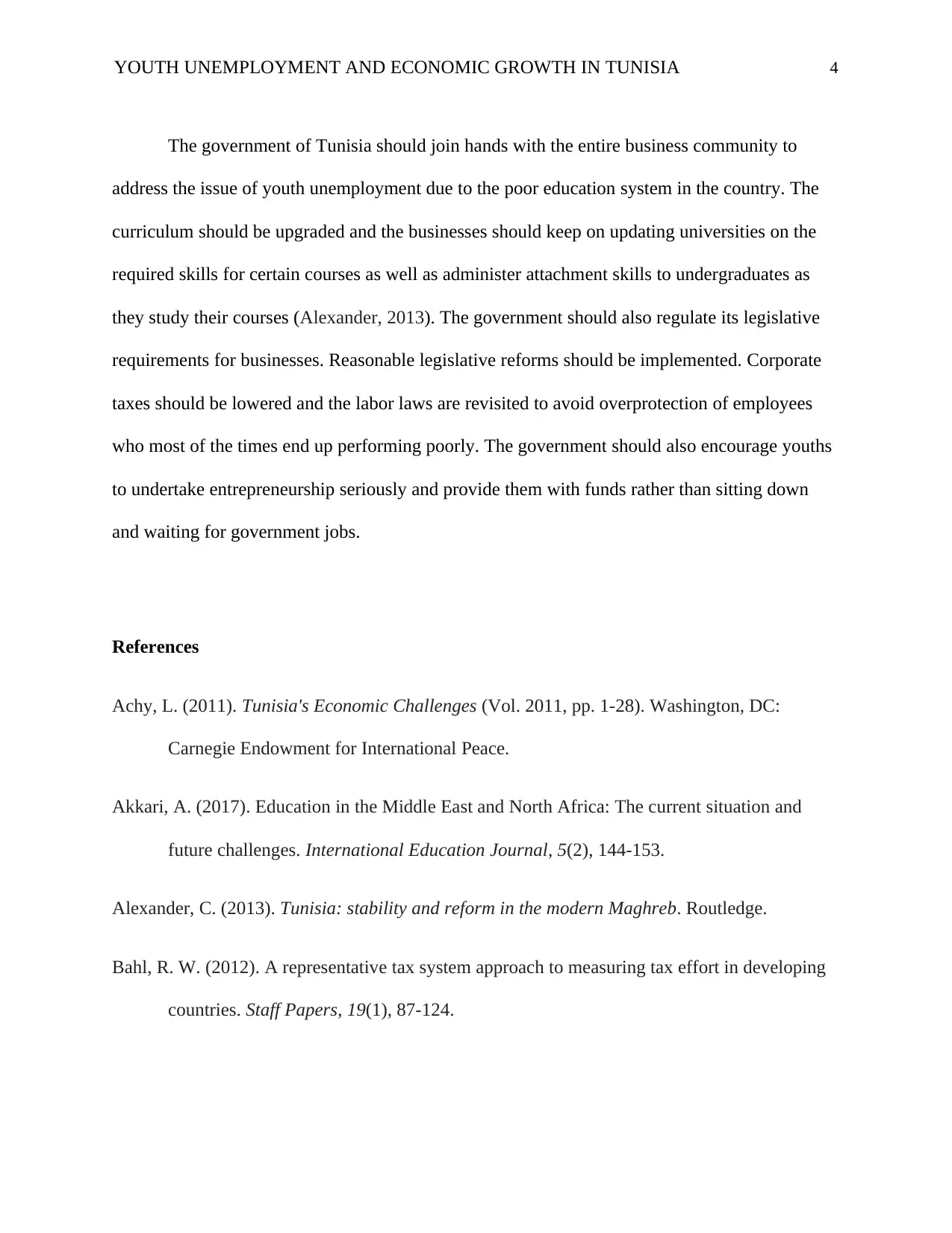
YOUTH UNEMPLOYMENT AND ECONOMIC GROWTH IN TUNISIA 4
The government of Tunisia should join hands with the entire business community to
address the issue of youth unemployment due to the poor education system in the country. The
curriculum should be upgraded and the businesses should keep on updating universities on the
required skills for certain courses as well as administer attachment skills to undergraduates as
they study their courses (Alexander, 2013). The government should also regulate its legislative
requirements for businesses. Reasonable legislative reforms should be implemented. Corporate
taxes should be lowered and the labor laws are revisited to avoid overprotection of employees
who most of the times end up performing poorly. The government should also encourage youths
to undertake entrepreneurship seriously and provide them with funds rather than sitting down
and waiting for government jobs.
References
Achy, L. (2011). Tunisia's Economic Challenges (Vol. 2011, pp. 1-28). Washington, DC:
Carnegie Endowment for International Peace.
Akkari, A. (2017). Education in the Middle East and North Africa: The current situation and
future challenges. International Education Journal, 5(2), 144-153.
Alexander, C. (2013). Tunisia: stability and reform in the modern Maghreb. Routledge.
Bahl, R. W. (2012). A representative tax system approach to measuring tax effort in developing
countries. Staff Papers, 19(1), 87-124.
The government of Tunisia should join hands with the entire business community to
address the issue of youth unemployment due to the poor education system in the country. The
curriculum should be upgraded and the businesses should keep on updating universities on the
required skills for certain courses as well as administer attachment skills to undergraduates as
they study their courses (Alexander, 2013). The government should also regulate its legislative
requirements for businesses. Reasonable legislative reforms should be implemented. Corporate
taxes should be lowered and the labor laws are revisited to avoid overprotection of employees
who most of the times end up performing poorly. The government should also encourage youths
to undertake entrepreneurship seriously and provide them with funds rather than sitting down
and waiting for government jobs.
References
Achy, L. (2011). Tunisia's Economic Challenges (Vol. 2011, pp. 1-28). Washington, DC:
Carnegie Endowment for International Peace.
Akkari, A. (2017). Education in the Middle East and North Africa: The current situation and
future challenges. International Education Journal, 5(2), 144-153.
Alexander, C. (2013). Tunisia: stability and reform in the modern Maghreb. Routledge.
Bahl, R. W. (2012). A representative tax system approach to measuring tax effort in developing
countries. Staff Papers, 19(1), 87-124.
Paraphrase This Document
Need a fresh take? Get an instant paraphrase of this document with our AI Paraphraser
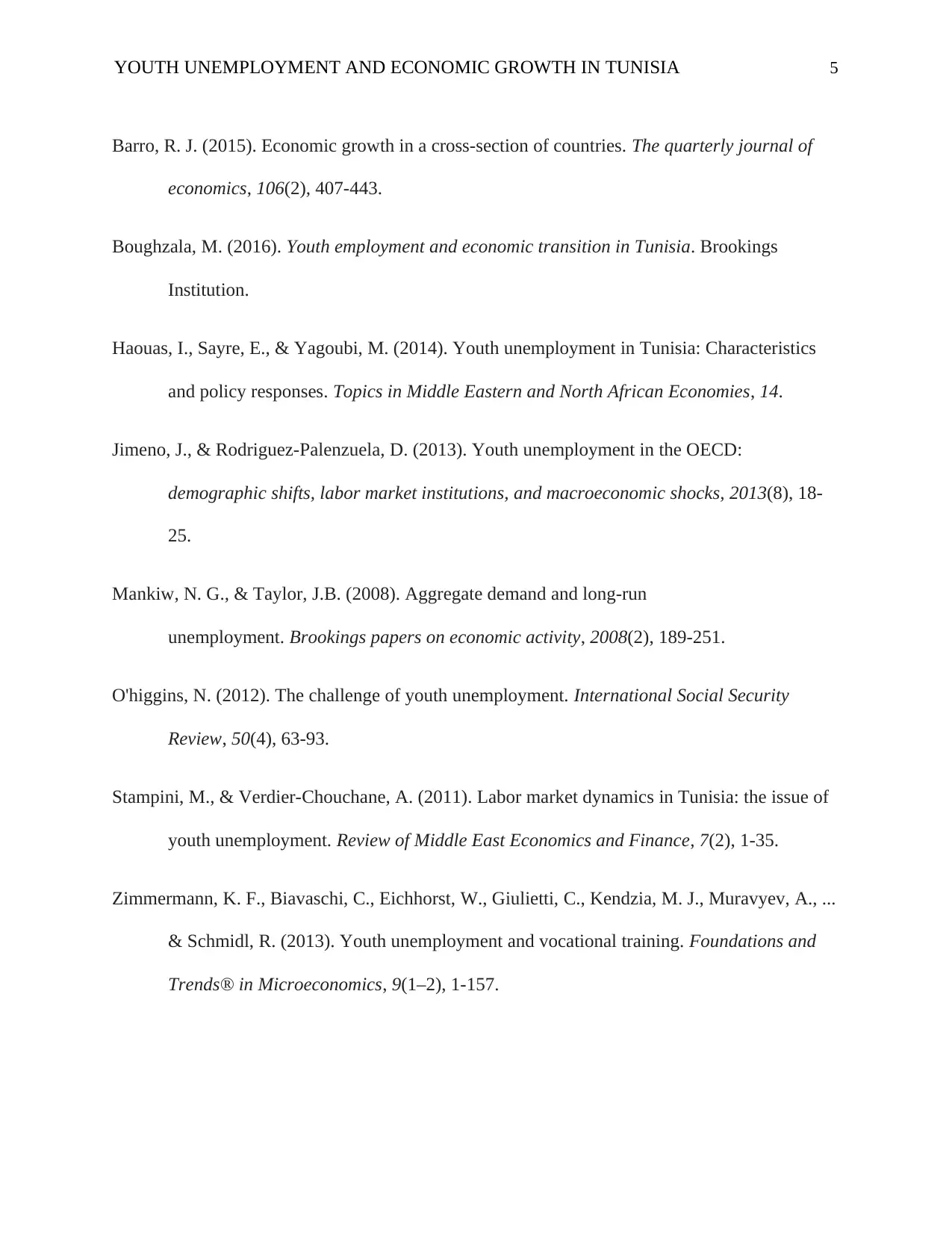
YOUTH UNEMPLOYMENT AND ECONOMIC GROWTH IN TUNISIA 5
Barro, R. J. (2015). Economic growth in a cross-section of countries. The quarterly journal of
economics, 106(2), 407-443.
Boughzala, M. (2016). Youth employment and economic transition in Tunisia. Brookings
Institution.
Haouas, I., Sayre, E., & Yagoubi, M. (2014). Youth unemployment in Tunisia: Characteristics
and policy responses. Topics in Middle Eastern and North African Economies, 14.
Jimeno, J., & Rodriguez-Palenzuela, D. (2013). Youth unemployment in the OECD:
demographic shifts, labor market institutions, and macroeconomic shocks, 2013(8), 18-
25.
Mankiw, N. G., & Taylor, J.B. (2008). Aggregate demand and long-run
unemployment. Brookings papers on economic activity, 2008(2), 189-251.
O'higgins, N. (2012). The challenge of youth unemployment. International Social Security
Review, 50(4), 63-93.
Stampini, M., & Verdier-Chouchane, A. (2011). Labor market dynamics in Tunisia: the issue of
youth unemployment. Review of Middle East Economics and Finance, 7(2), 1-35.
Zimmermann, K. F., Biavaschi, C., Eichhorst, W., Giulietti, C., Kendzia, M. J., Muravyev, A., ...
& Schmidl, R. (2013). Youth unemployment and vocational training. Foundations and
Trends® in Microeconomics, 9(1–2), 1-157.
Barro, R. J. (2015). Economic growth in a cross-section of countries. The quarterly journal of
economics, 106(2), 407-443.
Boughzala, M. (2016). Youth employment and economic transition in Tunisia. Brookings
Institution.
Haouas, I., Sayre, E., & Yagoubi, M. (2014). Youth unemployment in Tunisia: Characteristics
and policy responses. Topics in Middle Eastern and North African Economies, 14.
Jimeno, J., & Rodriguez-Palenzuela, D. (2013). Youth unemployment in the OECD:
demographic shifts, labor market institutions, and macroeconomic shocks, 2013(8), 18-
25.
Mankiw, N. G., & Taylor, J.B. (2008). Aggregate demand and long-run
unemployment. Brookings papers on economic activity, 2008(2), 189-251.
O'higgins, N. (2012). The challenge of youth unemployment. International Social Security
Review, 50(4), 63-93.
Stampini, M., & Verdier-Chouchane, A. (2011). Labor market dynamics in Tunisia: the issue of
youth unemployment. Review of Middle East Economics and Finance, 7(2), 1-35.
Zimmermann, K. F., Biavaschi, C., Eichhorst, W., Giulietti, C., Kendzia, M. J., Muravyev, A., ...
& Schmidl, R. (2013). Youth unemployment and vocational training. Foundations and
Trends® in Microeconomics, 9(1–2), 1-157.
1 out of 5
Related Documents
Your All-in-One AI-Powered Toolkit for Academic Success.
+13062052269
info@desklib.com
Available 24*7 on WhatsApp / Email
![[object Object]](/_next/static/media/star-bottom.7253800d.svg)
Unlock your academic potential
Copyright © 2020–2026 A2Z Services. All Rights Reserved. Developed and managed by ZUCOL.





